In a new study, researchers from the Swiss Humbs Biomed SA and the University of Washington found an antibody identified for the first time in blood samples from a patient with the severe acute respiratory syndrome (SARS, commonly known as atypical pneumonia) in 2003 which can inhibit related coronaviruses, including the new coronavirus SARS-CoV-2 that causes 2019 coronavirus disease (COVID-19). This antibody, called S309, is currently in rapid development and testing at Vir Biotechnology (hereinafter referred to as Vir), and clinical trials may be carried out in the next step. The relevant research results were published online in the journal Nature. The paper titled “Cross-neutralization of SARS-CoV and SARS-CoV2 by a human monoclonal antibody”. The authors of this paper have been studying the structure and function of multiple coronavirus infectious complexes for many years.
Veesler said, “We still need to prove that this antibody has a protective effect in living systems, which has not been done so far.”
He added, “There are currently no approved tools or licensed therapeutic drugs that have been shown to fight the coronavirus that causes COVID-19.” If this antibody is proven to fight the new coronavirus SARS-CoV-2 in humans, then it may become part of the pandemic arsenal.
Veesler said his laboratory is not the only one seeking to use neutralizing antibodies to treat COVID-19. The difference in this antibody is that it wasn’t found in patients with COVID-19, but in people who were infected during the SARS epidemic 17 years ago. Veesler said, “Compared to other research teams, this is what allows us to make progress so quickly.”

The researchers identified several monoclonal antibodies of interest from memory B cells of SARS survivors. Memory B cells are formed after suffering from infectious diseases. Their cell lineages can persist, and sometimes they can survive forever. They usually remember a pathogen, or a pathogen similar to it, and initiate antibody defense against its reinfection.
Several antibodies in memory B cells of SARS survivors target a protein structure on the surface of the coronavirus: the spike protein (S protein) trimmer. This structure is critical to the ability of the coronavirus to recognize the ACE2 receptor on the host cell surface, fuse with it, and inject their genetic material into the host cell. This infectious complex (the aforementioned S protein trimmer) is located in the spike structure of the coronavirus.
The S309 antibody is particularly powerful in targeting the spike protein that promotes coronavirus entry into the host cell and disabling the S protein. It can neutralize the SARS-CoV-2 virus by binding to the S protein fragment near the attachment site of the host cell.
Through cryo-electron microscopy studies and binding test experiments, these researchers learned that the S309 antibody recognizes a binding site on the surface of the coronavirus. This binding site is conserved among many viruses in the genus β-coronavirus sarbocovirus, which is not only conserved in SARS-CoV (coronavirus that causes SARS) and SARS-CoV-2 virus. This is probably why this antibody works not just against one coronavirus but against multiple related coronaviruses.
Combining the S309 antibody with other weaker antibodies found in recovered SARS patients can enhance the neutralization of the SARS-CoV-2 virus.
The researchers said that this method of antibody mixtures may help limit the ability of coronaviruses to form mutants, making them unable to evade single antibody treatment.
The researchers pointed out that they hope that these preliminary results will pave the way for the use of S309 antibody alone or in combination as a preventive measure for high-risk groups exposed to SARS-CoV-2, or as a drug that limits or treats serious diseases after exposure.
Reference
- Dora Pinto et al. Cross-neutralization of SARS-CoV-2 by a human monoclonal SARS-CoV antibody. Nature, 2020, doi:10.1038/s41586-020-2349-y.
- Antibody neutralizes SARS and COVID-19 coronaviruses. https://medicalxpress.com/news/2020-05-antibody-neutralizes-sars-covid-coronaviruses.html